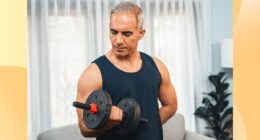When Donald Unger was a child, his mother and several aunts – and later his mother-in-law – told him that cracking his knuckles would lead to arthritis. Rather than stop (or at least do it less obtrusively), Unger embarked on his own experimental programme: for 50 years, he cracked the knuckles of his left hand at least twice a day, leaving his right-hand knuckles to crack spontaneously, or not at all. After 36,500 cracks or so, the results were clear, at least for Unger, who had become a doctor and published his findings in the journal Arthritis and Rheumatism. “There was no arthritis in either hand, and no apparent differences between the two hands,” he concluded. If you can’t applaud Unger for his half-century of dedication, you have to at least respect him for not calling it a “cracking” result.
Still, voluntary knuckle-cracking is one thing – what about all the other clicks, crunches and crackles that seem to increase in tempo as you start to age? Generally, it’s pretty good news. “Lots of people have joints that click from time to time, and that’s completely normal,” says Claire Speer, a physiotherapist and “musculoskeletal champion” for the charity Versus Arthritis. “I myself often notice a sense of relief when my back or shoulder clicks after stretching or a massage, when everything just feels like it moves a little easier.”
What causes all the noise in the first place? A 2015 study based on MRI scans suggests that the satisfying/disgusting pop of a knuckle crack seems to come from small bubbles appearing in the synovial fluid that surrounds and lubricates the joint between two bones. When the joint is stretched, the pressure in the capsule of connective tissue surrounding the joint drops, meaning that these bubbles briefly appear. It’s believed that their appearance is what makes the “crack” – as they collapse harmlessly back into the fluid over the next 20 minutes or so, explaining the cool-off period even veteran crackers have to respect. Some knuckles, it is theorised, are too loose or too tight to crack, leaving those in the Goldilocks zone of cracking to annoy everyone else.
The main concern about knuckle-cracking, at least for the authors of one frequently cited paper from 1990, is that it leads to “the rapid release of energy in the form of sudden vibratory energy, much like the forces responsible for the destruction of hydraulic blades and ship propellers”. And while the 1990 researchers concluded that there was no increased evidence of arthritis among knuckle crackers, they were “more likely to have hand swelling and lower grip strength”, and the practice therefore “results in functional hand impairment”. That finding, however, has since been contradicted in a 2016 study that found no correlation between cracking and weakened grip – and the older study might have indicated correlation more than causation, as cracking was also associated with smoking and drinking.
READ RELATED: ‘We need to find our kin, people who speak the same language’: the power of shared grief, from Covid to the Queen
So when is it time to worry? “If you get pain, swelling or deformity in a clicky joint then you should get it checked out as this may be a sign of injury or arthritis in the joint,” says Speer. “Likewise, if it is clicking, popping or crunching with every movement it is worth getting it checked by a health professional, such as a physiotherapist, to make sure the joint and its surrounding soft tissue are functioning properly.”
It’s also worth having it examined if there is an immediate change to the shape of the joint – especially at the kneecap or shoulder. “This can indicate a joint is partly dislocating before returning to its proper position,” says Speer. “Again, a physiotherapist would be a good person to assess that.”
One final note of caution: you can always overdo it. In 1999, the American Journal of Orthopedics published an article by Peter Chan, a hand surgeon: Consequences of Knuckle Cracking: A Report of Two Acute Injuries. In it, he describes two patients who were so keen to hear the pop that they sprained their fingers doing it. Maybe Donald Unger’s mum had a point after all.




